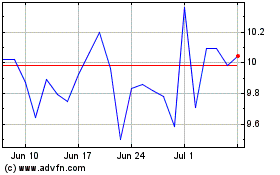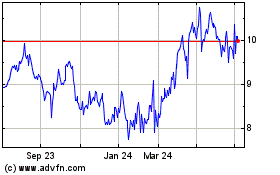Bank of Ireland(Governor&Co) Change of Group External Auditor for 2018 (3798G)
May 26 2017 - 7:00AM
UK Regulatory
TIDMBKIR
RNS Number : 3798G
Bank of Ireland(Governor&Co)
26 May 2017
The Governor and Company of the Bank of Ireland (the
"Group")
Change of Group External Auditor for 2018
26 May 2017
In the context of the relevant regulatory requirements, Bank of
Ireland Group previously announced its intention to conduct an
audit tender during 2017. A competitive tender process, overseen by
the Group's Audit Committee ("GAC"), has recently been undertaken
and the Court of Directors has approved GAC's recommendation for
the appointment of KPMG as Group External Auditor for the year
ending 31 December 2018 and beyond. The appointment of KPMG will be
recommended to stockholders for approval at the 2018 Annual General
Meeting.
PricewaterhouseCoopers ("PwC"), the current Group External
Auditor, will continue in its role and audit the Group's
consolidated accounts for the year ending 31 December 2017.
Kent Atkinson, Chairman of the Group Audit Committee, said "We
would like to thank PwC for their significant contribution as the
Group External Auditor since their appointment as sole auditors to
the Group in 1990. We would also like to thank the firms who took
part in the tender process and we look forward to working with KPMG
in their role as external auditors".
Ends
For further information please contact:
Bank of Ireland
Andrew Keating Group Chief Financial Officer +353 (0)766 23
5141
Alan Hartley Director of Group Investor Relations +353 (0)766 23
4850
Pat Farrell Head of Group Communications +353 (0)766 23 4770
Forward-Looking Statement
This document contains certain forward-looking statements with
respect to certain of the Bank of Ireland Group's (the 'Group')
plans and its current goals and expectations relating to its future
financial condition and performance, the markets in which it
operates, and its future capital requirements. These
forward-looking statements often can be identified by the fact that
they do not relate only to historical or current facts. Generally,
but not always, words such as 'may,' 'could,' 'should,' 'will,'
'expect,' 'intend,' 'estimate,' 'anticipate,' 'assume,' 'believe,'
'plan,' 'seek,' 'continue,' 'target,' 'goal,' 'would,' or their
negative variations or similar expressions identify forward-looking
statements, but their absence does not mean that a statement is not
forward-looking. Examples of forward-looking statements include
among others, statements regarding the Group's near term and longer
term future capital requirements and ratios, level of ownership by
the Irish Government, loan to deposit ratios, expected impairment
charges, the level of the Group's assets, the Group's financial
position, future income, business strategy, projected costs,
margins, future payment of dividends, the implementation of changes
in respect of certain of the Group's pension schemes, estimates of
capital expenditures, discussions with Irish, United Kingdom,
European and other regulators and plans and objectives for future
operations.
Such forward-looking statements are inherently subject to risks
and uncertainties, and hence actual results may differ materially
from those expressed or implied by such forward-looking statements.
Such risks and uncertainties include, but are not limited to, the
following: geopolitical risks which could potentially adversely
impact the markets in which the Group operates; uncertainty
following the UK vote to exit the EU as to the nature, timing and
impact of a UK exit, could impact the markets in which the Group
operates including pricing, partner appetite, customer confidence
and demand, and customers' ability to meet their financial
obligations and consequently the Group's financial performance,
balance sheet, capital and dividend capacity; concerns on sovereign
debt and financial uncertainties in the EU and the potential
effects of those uncertainties on the financial services industry
and on the Group; general and sector specific economic conditions
in Ireland, the United Kingdom and the other markets in which the
Group operates; the ability of the Group to generate additional
liquidity and capital as required; property market conditions in
Ireland and the United Kingdom; the potential exposure of the Group
to credit risk and to various types of market risks, such as
interest rate risk and foreign exchange rate risk; the impact on
lending and other activity arising from the emerging macro
prudential policies; the performance and volatility of
international capital markets; the Group's ability to address
weaknesses or failures in its internal processes and procedures
including information technology issues, cyber-crime risk,
equipment failures and other operational risk; the effects of the
Irish Government's stockholding in the Group (through the Ireland
Strategic Investment Fund) and possible changes in the level of
such stockholding; changes in applicable laws, regulations and
taxes in jurisdictions in which the Group operates particularly
banking regulation by the Irish and United Kingdom Governments
together with the operation of the Single Supervisory Mechanism and
the Single Resolution Mechanism; the impact of the continuing
implementation of significant regulatory and accounting
developments such as Basel III, Capital Requirements Directive
(CRD) IV, Solvency II, the Recovery and Resolution Directive and
IFRS 9; the potential impact of certain ECB initiatives including
its thematic review of internal models termed Targeted Review of
Internal Models (TRIM); the exercise by regulators of powers of
regulation and oversight in Ireland and the United Kingdom; the
exposure of the Group to conduct risk such as staff members
conducting business in an inappropriate or negligent manner; the
introduction of new government policies or the amendment of
existing policies in Ireland or the United Kingdom; the outcome of
any legal claims brought against the Group by third parties or
legal or regulatory proceedings more generally, that may have
implications for the Group; the development and implementation of
the Group's strategy, including the Group's ability to achieve its
targets and ambitions on net interest margins and total operating
expenses; the inherent risk within the Group's life assurance
business involving claims, as well as market conditions generally;
potential further contributions to the Group sponsored pension
schemes if the value of pension fund assets is not sufficient to
cover potential obligations; the Group's ability to meet customers'
expectations in mobile, social, analytics and cloud technologies
which have enabled a new breed of 'digital first' propositions,
business models and competitors; failure to establish availability
of future taxable profits, or a legislative change in quantum of
deferred tax assets currently recognised; and difficulties in
recruiting and retaining appropriate numbers and calibre of
staff.
Nothing in this document should be considered to be a forecast
of future profitability or financial position and none of the
information in this document is or is intended to be a profit
forecast or profit estimate. Any forward-looking statement speaks
only as at the date it is made. The Group does not undertake to
release publicly any revision to these forward-looking statements
to reflect events, circumstances or unanticipated events occurring
after the date hereof.
This information is provided by RNS
The company news service from the London Stock Exchange
END
MSCUNARRBNAVUAR
(END) Dow Jones Newswires
May 26, 2017 07:00 ET (11:00 GMT)
Bank Of Ireland (LSE:BIRG)
Historical Stock Chart
From Mar 2024 to Apr 2024

Bank Of Ireland (LSE:BIRG)
Historical Stock Chart
From Apr 2023 to Apr 2024
